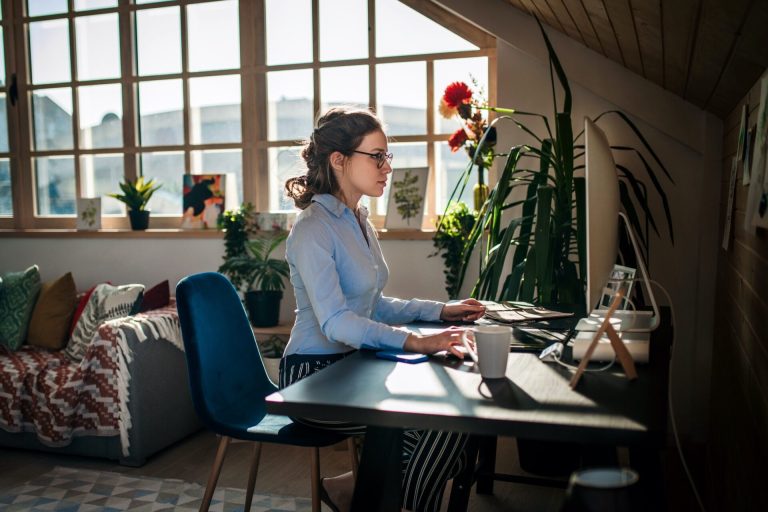What expenses can I claim if I work from home?
One of the biggest benefits of working for yourself is the ability to work from home. No more crowded commutes. You have the freedom to tailor your personal responsibilities and interests to work. It’s far from the nine to five schedule we’re all used to.
Depending on the nature of your business, working from home also allows you to qualify for certain expenses. As always, HMRC’s rules regarding what you can consider expenses can be a bit complicated. We have created this simple guide to help you get what you are entitled to.
How do I get reimbursed for home office expenses?
The key to a home office expense claim is proof that you regularly spend time doing your work in that office. If you just come home to answer a few emails and do some file work, but are actually doing most of your duties on site or at the client’s office, you won’t be able to file a claim.
The same basically applies to the equipment you buy – you can make claims for things like chairs and computers if you can prove they are wholly and exclusively designed for use in your work. HMRC’s rules on what you can and cannot claim are slightly different for sole proprietors and limited companies. (See here the pros and cons of these two business structures).
Claim as a sole trader
Sole proprietors have two options: you can claim simplified expenses for the self-employed, or you can calculate the value of your expenses by calculating the share of personal and commercial use of your home. This means that you will need to figure out how much of, say, your electricity bill your business contributed.
The first option is the simplest – HMRC even calls this option “simplified expenses.” Basically, you can qualify for a flat rate of spending based on the number of hours you work from home each month:
- £10 if you work 25 to 50 hours
- £18 from 51 to 100 hours
- £26 for 101 hours or more.
The simplified cost method covers only the costs of heat, light and electricity. You can include these costs in your “actual cost” if you are sure that it will be more profitable for your business. Other expenses that you may list as “actual expenses” include a portion of the costs of maintaining the home, such as rent, mortgage interest (mortgage payments are not allowed, only a portion of interest), and council tax. You can also claim the amount you actually used for your broadband and phone bills.
To claim actual expenses, you need to “fairly and reasonably” allocate the cost of maintaining the home between your business and personal activities. One way to do this is based on floor area. For example, if you have 5 rooms and use one of them 90% of the time for your business, then you add up all your respective bills and multiply by 1/5 and then by 90%.
If you are claiming 100% of a certain room for business use, you may be liable to pay capital gains tax on that part of the house if you sell it. Try to make sure every room has a dual purpose to avoid this.
Application as a Limited Liability Company
There are two ways to calculate home office costs: use the HMRC fixed amount, or enter into a lease agreement between you and your limited liability company.
HMRC’s flat rate is currently £4 a week – or £208 a year – and you don’t need to provide any receipts for your expenses.
Renting out your home office to your limited liability company is much more difficult, although it does mean you can claim more than the flat rate of £208 a year. You will need to draw up a lease, set the rent at a realistic level, and have a dedicated room for business purposes only. This means that you will likely be liable for capital gains tax if you sell the house. There is a lot more to consider as you go down this path. For more details, see This article and make sure you review your options and set up effective record keeping systems with an accountant.
What other expenses can you require for your home office?
Whether you are a sole trader or a limited company, you can claim reimbursement for the proportion of time your business uses broadband at home, and for all business calls from your work or personal cell phone. It always helps if you can customize these services through your business.
Is decoration an allowable expense?
You can claim part of the related repairs and improvements to the property. For example, if you are decorating a room that you use primarily for business, you can specify a usage rate (eg 90%). If you use a lot of water, such as in hairdressing or pet care, you may be able to charge more than your standard household use.
You will also be able to qualify for the purchase of equipment that is entirely and exclusively dedicated to your professional duties, such as working computer and specialized software. You can also claim reasonable reimbursement for office equipment and furnishings (such as chairs or bookcases).
There are two key questions that will help you determine what you can and cannot claim as business expenses: “Are these expenses wholly and exclusively business expenses, and can I prove it?”
If you ever have any doubts, the best course of action is to talk to the accountant and move past him.







